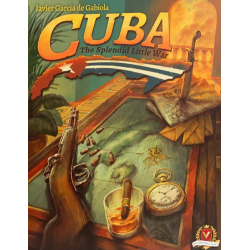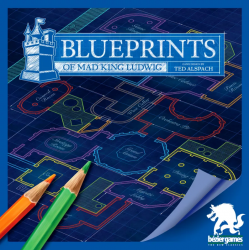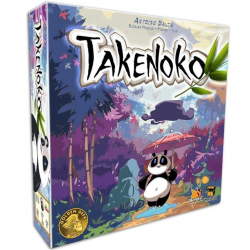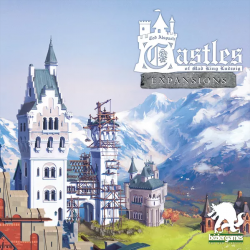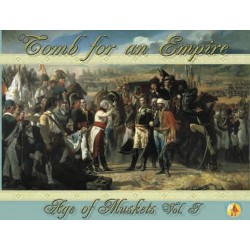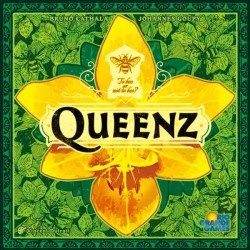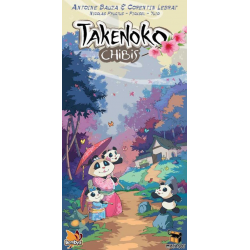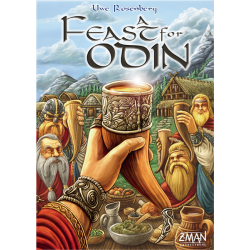No products in the cart.
Active filters
Garden Rush
Garden Rush is a two-player, tile-placement battle game in a vegetable garden in which players race to grow vegetables in their garden and fill their basket before their neighbor. Careful planning is needed to plant each vegetable in its unique pattern for future harvesting, while keeping an eye on the conveyor belt shared between the gardens.
Takenoko
A long time ago at the Japanese Imperial court, the Chinese Emperor offered a giant panda bear as a symbol of peace to the Japanese Emperor. Since then, the Japanese Emperor has entrusted his court members (the players) with the difficult task of caring for the animal by tending to his bamboo garden.
In Takenoko, the players will cultivate land plots, irrigate them, and grow one of the three species of bamboo (Green, Yellow, and Pink) with the help of the Imperial gardener to maintain this bamboo garden. They will have to bear with the immoderate hunger of this sacred animal for the juicy and tender bamboo. The player who manages his land plots best, growing the most bamboo while feeding the delicate appetite of the panda, will win the game.
Cuba: The Splendid Little War
Cuba: The Splendid Little War, from designer Javier Garcia de Gabiola, is a two-player simulation of the third War of Cuban Independence, which lasted from 1895 to 1898. (This was the last of the three liberation wars fought between Cuba and Spain; the previous wars were the Ten Years\' War (1868-1878) and the Little War (1879-1880). One player controls the forces of the Spanish colonial government, fighting to retain Cuba; the other player controls the Cuban rebels fighting for their independence.
Blueprints of Mad King Ludwig
Test your architectural skills in Blueprints of Mad King Ludwig, a flip-and-sketch strategy game to draw the most extravagant blueprints for King Ludwig\'s next castle!
Takenoko
A long time ago at the Japanese Imperial court, the Chinese Emperor offered a giant panda bear as a symbol of peace to the Japanese Emperor. Since then, the Japanese Emperor has entrusted his court members (the players) with the difficult task of caring for the animal by tending to his bamboo garden.
Castles of Mad King Ludwig: Expansions
In Castles of Mad King Ludwig, you built the perfect castles subject to the whims of the King. But now he wants even more (he is mad, after all). Castles of Mad King Ludwig: Expansions contains several expansions that can be played separately or in any combination, as well as brand new bonus cards and favors.
Age of Muskets Volume I: Tomb for an Empire
Age of Muskets is a rule set that covers the campaigns from the late XVII century to the first half of the XIX. It emphasizes Command and Control as well as the uncertainty and friction of any military operation. Players take command of an army of the period, represented by their headquarters, and control their attached units, their men and equipment. The purpose is to re-create all the relevant factors of war at the operational level in the pre-industrial age.
Queenz
In Queenz, the newest game from Bruno Cathala and Johannes Goupy, the players are beekeepers planting orchids to attract bees and produce the tastiest honey.
Takenoko: Chibis
A long time ago, the Emperor of China offered to the Emperor of Japan a giant panda, a symbol of peace. Your delicate mission: Take care of the animal by planning a bamboo field. Now as a reward for your great work, you are being offered a second panda...a female!
Pax Pamir: Second Edition
In Pax Pamir, players assume the role of nineteenth century Afghan leaders attempting to forge a new state after the collapse of the Durrani Empire. Western histories often call this period "The Great Game" because of the role played by the Europeans who attempted to use central Asia as a theater for their own rivalries. In this game, those empires are viewed strictly from the perspective of the Afghans who sought to manipulate the interloping ferengi (foreigners) for their own purposes.
Feast for Odin
Using the central board in A Feast for Odin, players have to hunt, gather basic materials, refine those materials, develop their production-buildings, build/buy ships, and raid settlements.
The resulting earnings are placed on the players\' board in the best possible pattern to produce income and (later) victory points.



